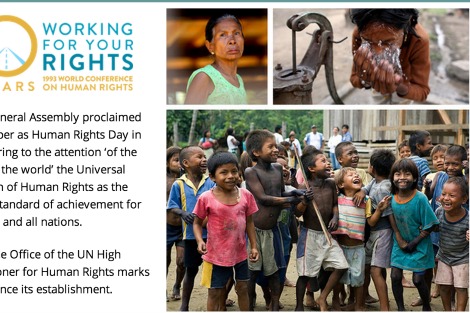 Universal Human Rights Day, celebrated this week, always has a sharp edge. It celebrates a journey travelled and points to landmines on the way ahead. The day itself commemorates the acceptance by the United Nations of the Universal Declaration of Human Rights in 1948. This document has set a benchmark for the protection of the dignity of human beings over the last 70 years.
Universal Human Rights Day, celebrated this week, always has a sharp edge. It celebrates a journey travelled and points to landmines on the way ahead. The day itself commemorates the acceptance by the United Nations of the Universal Declaration of Human Rights in 1948. This document has set a benchmark for the protection of the dignity of human beings over the last 70 years.
The landmines are laid by governments that respect only such rights as they deem to be in the national interest. Last week, for example, Immigration Minister Scott Morrison introduced a permanent cap on protection visas which had the effect of leaving 33,000 people on bridging visas without work rights. A ministerial note stated that 'a Human Rights Statement of Compatibility is not required'.
The agreement by so many nations to agree to the principles enunciated in the United Nations universal declaration of human rights, and later codified in the Covenant on Civil and Political Rights and the Covenant on Economic, Social and Cultural Rights, seems even more remarkable today because it took place at a time of deep hostility and fear between the Western and Eastern bloc of nations. It shows how deeply the devastation and suffering caused by the Second World War had convinced people that respect for human rights was essential for peace.
To uphold this respect, however, we need to do more than assert a list of rights. These are always vulnerable to the cynical dismissal canonised in Jeremy Bentham's immortal phrase about the many declarations on human rights arising from the French Revolution: 'Natural rights is simple nonsense: natural and imprescriptible rights, rhetorical nonsense — nonsense upon stilts.'
Governments are at heart Benthamite. Unless the commitment to humanity goes deeper than asserting an arbitrary set of rights, they will be dishonoured when expedient. The United Nations Declaration on Human Rights is illustrative in this respect. The rights do not come out of thin air but amplify the implications of the affirmation in the United Nations Charter of the 'dignity and worth of the human person'.
Human rights then are rooted and linked through the concept of human dignity, understood as the conditions under which human beings can flourish. These conditions can be spelled out roughly in terms of the human need for food and shelter, for security, for love and nurture, for education, for freedom of movement, speech, religion and association, for protection by the rule of law, for raising a family, for work and contributing to society.
This spelling out of the conditions necessary for human flourishing shows why it is inadequate to defend rights without an understanding of what human dignity requires. Simply to focus on rights will sell humanity short.
Western societies strongly emphasise the freedom of the individual to choose, and so canonise individual rights. They place less emphasis on social rights to education, to work, to associate freely and so on. But these are critical to human flourishing because human beings are social. Disregard for social rights lies at the heart of the human destruction involved in Australian treatment of asylum seekers.
If we think of rights as a disconnected and ungrounded list, too, we are likely to reduce rights first to what can be legislated and then to what actually is legislated. If rights arise through legislation they can be removed by legislation, and are no longer universal. They rest on the whim of the state.
If human rights are reduced to those that can be prescribed in legislation, too, they will neglect essential conditions of human flourishing. If a child is to grow into a flourishing adult, for example, she ordinarily must be loved and supported in stable relationships. Although it would be impossible to legislate for this kind of love, children still have a right to be loved.
Human Rights Day defends rights. It also assumes a rich understanding of human dignity. We celebrate the fact that the rights it enunciated are universal. We can also celebrate the local Australian support for it, embodied in William Hodgson who helped helped draft the declaration.
The Declaration of Human Rights exists as a standard by which we can judge our national life and priorities. By these criteria Australian public life displays grounds for concern. In the case of unpopular groups like asylum seekers, prisoners and bikies, governments spend more effort on seeking to evade the claims of human rights than to uphold them.
In the 'nonsense on stilts' stakes the unfettered appeal to national interest walks far taller than advocacy of human rights.
 Andrew Hamilton is consulting editor of Eureka Street.
Andrew Hamilton is consulting editor of Eureka Street.